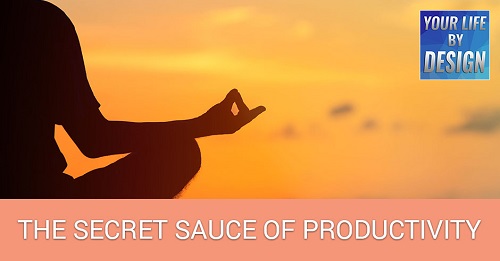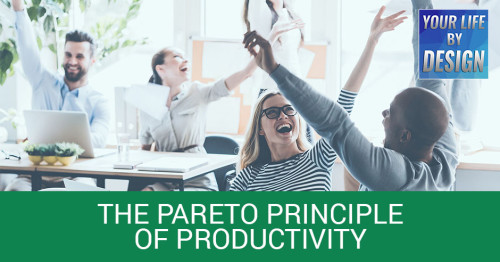In this complex world filled with noise and distractions, we may sometimes find it impossible to achieve calmness, wellness, and productivity at its fullest. Meditation will make you more productive. It might sound strange that sitting still and doing nothing for a period of time will make you more productive, but it’s true. Dr. Sundardas walks us through the process of meditation. He enumerates its benefits such as making you more productive, energized, calm, and all good things that will surely help you get the best out of yourself.
The Secret Sauce Of Productivity
Meditation will make you more productive. It might sound strange that sitting still and doing nothing for a period of time will make you more productive, but it’s true. Before diving into what to do, it’s worth going over why you should meditate in the first place. I’ve combined benefits observed by research with my personal observations over the last 40 years I’ve been meditating, which is slightly less scientific. Some benefits of meditation include greatly calming effects. Research has shown that EEG activity decreases during meditation. Meditation also helps to recharge you so you have more energy throughout the day. The practice increases the blood flow in your brain and according to one neurophysiologist rewires the circuitry of your brain. It’s been proven that people who meditate need less sleep. Meditation makes your brain age slower and increases the amount of grey matter in your brain.
Grey matter is responsible for muscle control, hearing, memory, emotions, and speech. Meditation makes it much easier to focus and achieve flow and the feeling of being completely immersed and energized by something. It also allows you to procrastinate less and get more done in the same amount of time. The practice has even shown to boost student’s test scores by 11% in one study. Meditation helps your mind defragment your thoughts so that you can make sense of them and step away from them to gain perspective. Needless to say, there are tons of benefits adopting a regular meditation practice, and these are just a few of them. Meditation is a very simple practice that people overcomplicate. This podcast focuses on the breathing meditation where you focus on your breath. Just imagine that.
The basic idea of meditation is simple. Every time your mind begins to shift the spotlight away from your breath and you get lost in thought, simply bring your attention back to your breath. Repeat this again and again until your meditation time resounds. The point is, every time you bring your attention back to your breath, you work out your attention muscle. Over time, your focus, concentration, and attention span improve in addition to the plethora of other benefits mentioned above. That’s the basic idea of meditation. You will need two things to get started but ensure that both of them are ready. You don’t need much of anything, but you should have two things. You should have some things to sit on. There’s such a thing as standing meditation and walking meditation, but sitting meditation is the most common and the best place to start. Since meditation is all about working out your attention muscle, having to check a clock somewhat defeats the purpose of meditation since it would constantly distract your attention away from your breath.
When I first started to meditate, I remember being dumbfounded on what exactly I had to do after I sat down. Two things confused me. How do I sit and what do I think about? Those are essentially the only things you need to worry about when it comes to meditation. How to sit? The biggest thing is to remember to keep your back straight. Keep your back erect. If you’re in a chair, it’s best not to rest your back on the back of the chair and keep an upright posture. Your eyes can be either closed or open. The goal of this whole meditation thing is to work out your attention muscle. Don’t worry about your hands. Some people like to form a circle with the thumb and another finger, but that doesn’t matter in my opinion. Cross the legs however you want. I cross my legs in front of me and I think that was fine for most people. If you want to put your feet like a pretzel, you can. Use meditation to strengthen your attention muscle. It may be the easiest cheat to a simple cross-legged pose. Look slightly downward even if your eyes are closed. This opens up your chest. Find a place that’s comfortable and that keeps you upright and opens up your chest at the same time.

The biggest part I can make about how to sit is to find the pose and posture that’s both comfortable and keeps you upright. The attention you give the different things around you is a spotlight. All day you’re moving around and pointed out different things. Without thinking too much about the fact that you’re doing this, as you move it around, you pointed at everything. You give attention too in your life, from your smartphone to a conversation you’re having to a report you’re writing. A lot of the time, you directed more than one thing at a time. Meditation takes that spotlight and it points directly at your breath so all of that is well and good, but what do you do exactly? First, get comfortable. Open the timer on your phone and get into an upright and comfortable posture. Dim the lights a bit or shut them off completely to help you focus better. Start your timer and bring your attention focused in your breath. This is what meditation is all about and this is what makes meditation both difficult and worthwhile.
In this third step, close your mouth and focusing on entirely on your breath as it enters and leaves your nose. Don’t think this is a hard part. Don’t analyze your breath. Just bring your attention and focus to your breath without thinking about it or analyzing it. Bring your attention back to your mind when it wanders and it works. I’ve been meditating for about 40 years and my mind still wanders sometimes. When your mind wanders, and it will, gently bring your attention back to your breath. Once you realize that your mind is wandering, just gently bring your attention back. Bring your mind back when it wanders. When your mind begins to think, gently bring your attention back to your breath. Meditate for ten minutes a day. It’s infinitely better than meditating for 70 minutes once a week. Try to meditate every day if possible, even if that just means sitting for a few minutes.
Start small. You may try to meditate for 30 minutes right from the start. I can almost guarantee that you will get frustrated and discouraged. I recommend starting with five minutes and only increasing that time when you’re comfortable. Meditate in a quiet place. Having fewer distractions around you will naturally allow you to concentrate better and will make your meditation much more productive. It’s easier to lose your attention during your out-breath. Your in-breath is very pronounced and easier to concentrate on. Most people’s minds wander on the out-breaths. Keep this in mind. Be easy on yourself when your mind wanders. It’s easy to become frustrated with yourself when your mind wanders, but don’t. Your meditation will be much more productive when you gently bring your attention back. If you can’t concentrate, try counting. Count your breaths until you reach five and then start again. I use this trick when I’m having a tough time concentrating.
One lucky listener that post a review in iTunes will win a private and confidential consultation and coaching with me on discovering your sole purpose. I will lead you on a personal journey to discover your unique mind and body psychosomatic map of your life. You’re going to get a detail report and a personal 45-minute consultation with me that’s worth thousands. I’m going to help you design a life that works so you are able to say yes to the things that matter and eliminate everything else that slows you down. The clearer you can be about how to organize your daily life to support your bigger vision, the more you step into to your true potential, stay on track, and accomplish all that you want and deserve. Are you ready to make that happen? Feel free to reach out to me to ask a question at AskDrSun.com. Your life is a gift, design it. Do what matters and join me each week as we get closer to design the life of your dreams. Join me on the next episode of Life by Design.



